Evidence-Based Practice: Enhancing Healthcare Through Research
VerifiedAdded on 2023/06/06
|6
|1350
|309
Essay
AI Summary
This essay provides a comprehensive overview of evidence-based practice (EBP) in healthcare, highlighting its importance in clinical decision-making and patient care. It discusses the integration of research findings into clinical practices, emphasizing the role of EBP in improving patient outcomes and delivering safe, effective medical treatments. The essay differentiates between EBP and research, noting that EBP utilizes research to inform clinical guidelines and decision-making, while research focuses on developing new knowledge. It also underscores the significance of quality assessment in ensuring the reliability and validity of research data before implementation in clinical settings. Examples of EBP, such as infection control, oxygen level management in COPD patients, and accurate blood pressure measurement, are provided to illustrate its practical application in nursing and healthcare. The essay concludes that EBP serves as a crucial guide for healthcare professionals, enabling them to make informed decisions and deliver high-quality care.
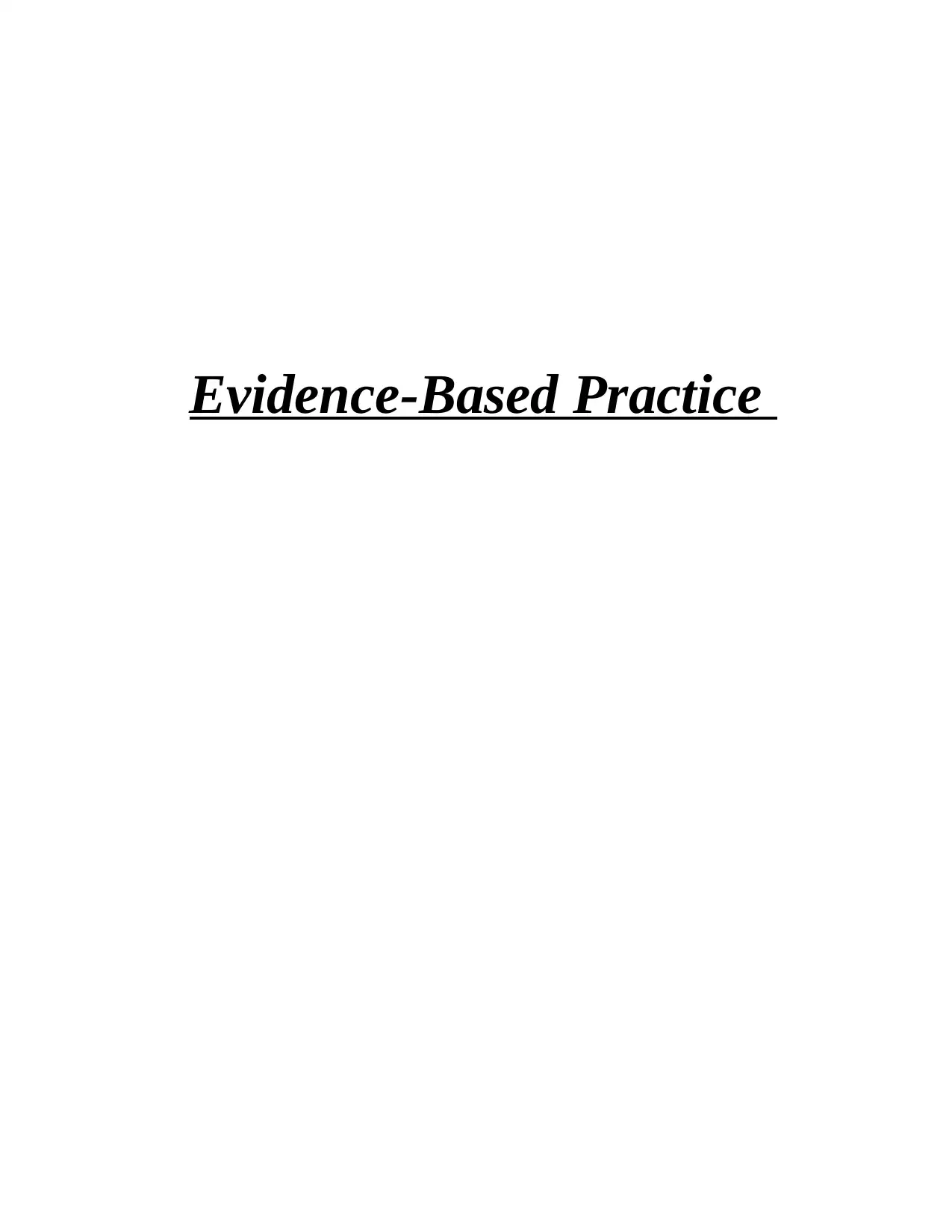
Evidence-Based Practice
Paraphrase This Document
Need a fresh take? Get an instant paraphrase of this document with our AI Paraphraser
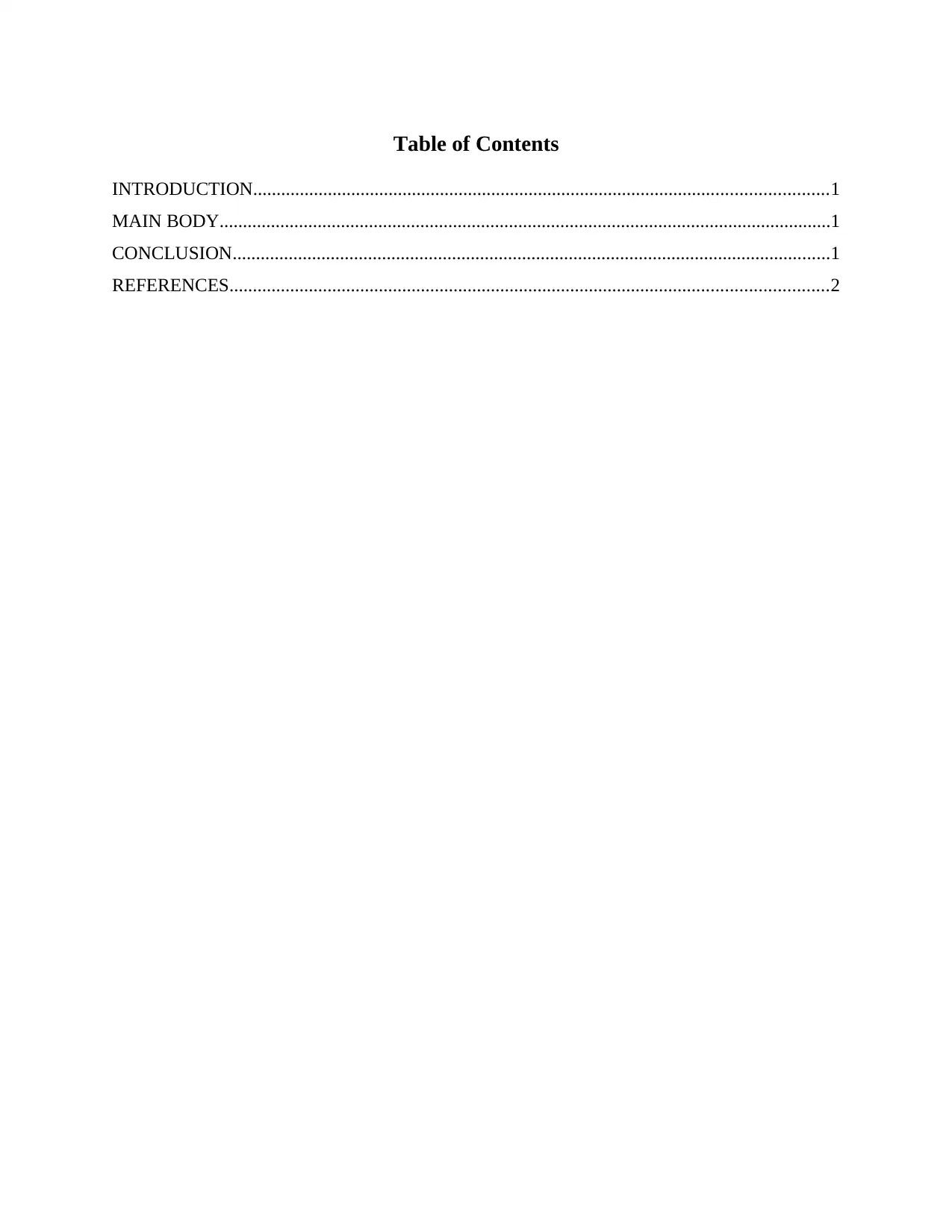
Table of Contents
INTRODUCTION...........................................................................................................................1
MAIN BODY...................................................................................................................................1
CONCLUSION................................................................................................................................1
REFERENCES................................................................................................................................2
INTRODUCTION...........................................................................................................................1
MAIN BODY...................................................................................................................................1
CONCLUSION................................................................................................................................1
REFERENCES................................................................................................................................2
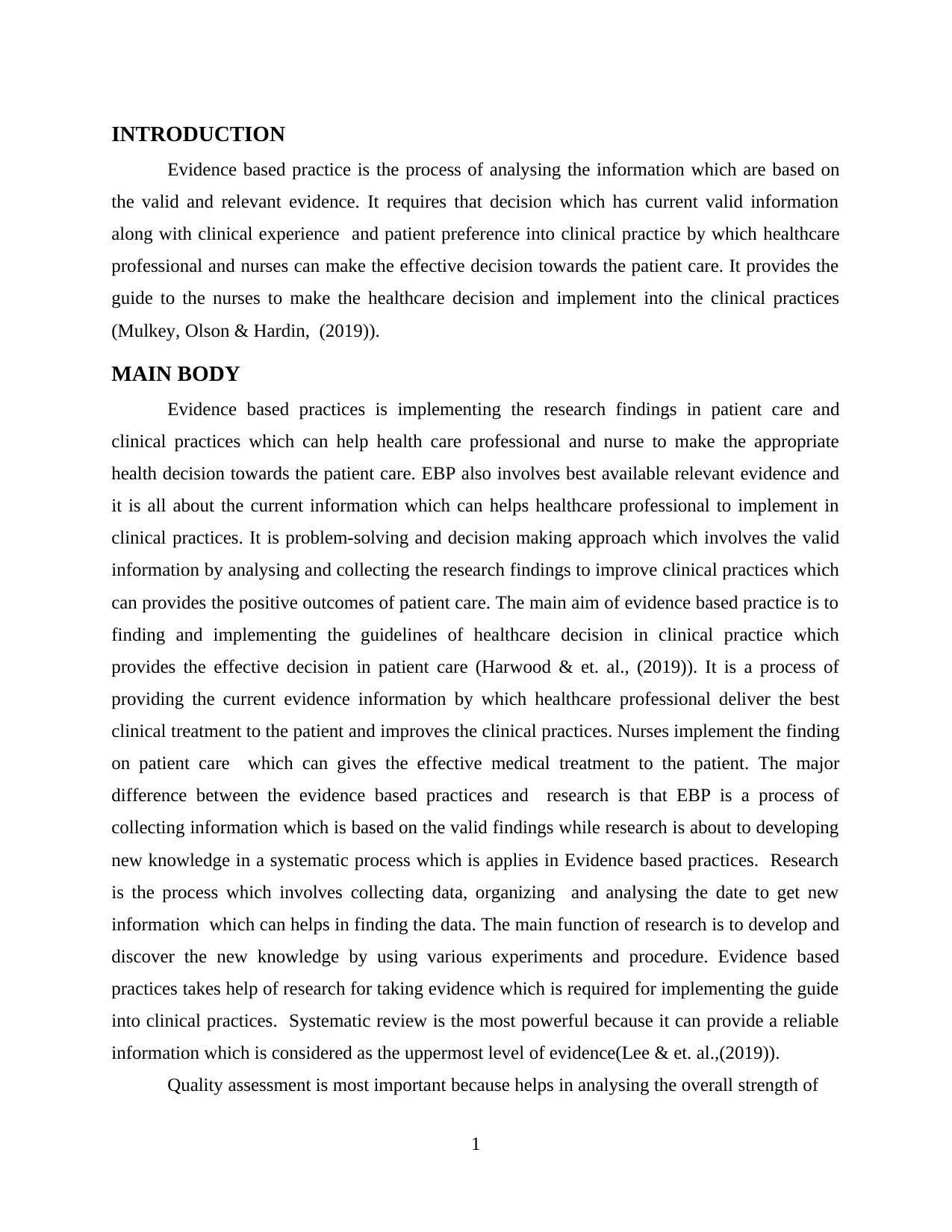
INTRODUCTION
Evidence based practice is the process of analysing the information which are based on
the valid and relevant evidence. It requires that decision which has current valid information
along with clinical experience and patient preference into clinical practice by which healthcare
professional and nurses can make the effective decision towards the patient care. It provides the
guide to the nurses to make the healthcare decision and implement into the clinical practices
(Mulkey, Olson & Hardin, (2019)).
MAIN BODY
Evidence based practices is implementing the research findings in patient care and
clinical practices which can help health care professional and nurse to make the appropriate
health decision towards the patient care. EBP also involves best available relevant evidence and
it is all about the current information which can helps healthcare professional to implement in
clinical practices. It is problem-solving and decision making approach which involves the valid
information by analysing and collecting the research findings to improve clinical practices which
can provides the positive outcomes of patient care. The main aim of evidence based practice is to
finding and implementing the guidelines of healthcare decision in clinical practice which
provides the effective decision in patient care (Harwood & et. al., (2019)). It is a process of
providing the current evidence information by which healthcare professional deliver the best
clinical treatment to the patient and improves the clinical practices. Nurses implement the finding
on patient care which can gives the effective medical treatment to the patient. The major
difference between the evidence based practices and research is that EBP is a process of
collecting information which is based on the valid findings while research is about to developing
new knowledge in a systematic process which is applies in Evidence based practices. Research
is the process which involves collecting data, organizing and analysing the date to get new
information which can helps in finding the data. The main function of research is to develop and
discover the new knowledge by using various experiments and procedure. Evidence based
practices takes help of research for taking evidence which is required for implementing the guide
into clinical practices. Systematic review is the most powerful because it can provide a reliable
information which is considered as the uppermost level of evidence(Lee & et. al.,(2019)).
Quality assessment is most important because helps in analysing the overall strength of
1
Evidence based practice is the process of analysing the information which are based on
the valid and relevant evidence. It requires that decision which has current valid information
along with clinical experience and patient preference into clinical practice by which healthcare
professional and nurses can make the effective decision towards the patient care. It provides the
guide to the nurses to make the healthcare decision and implement into the clinical practices
(Mulkey, Olson & Hardin, (2019)).
MAIN BODY
Evidence based practices is implementing the research findings in patient care and
clinical practices which can help health care professional and nurse to make the appropriate
health decision towards the patient care. EBP also involves best available relevant evidence and
it is all about the current information which can helps healthcare professional to implement in
clinical practices. It is problem-solving and decision making approach which involves the valid
information by analysing and collecting the research findings to improve clinical practices which
can provides the positive outcomes of patient care. The main aim of evidence based practice is to
finding and implementing the guidelines of healthcare decision in clinical practice which
provides the effective decision in patient care (Harwood & et. al., (2019)). It is a process of
providing the current evidence information by which healthcare professional deliver the best
clinical treatment to the patient and improves the clinical practices. Nurses implement the finding
on patient care which can gives the effective medical treatment to the patient. The major
difference between the evidence based practices and research is that EBP is a process of
collecting information which is based on the valid findings while research is about to developing
new knowledge in a systematic process which is applies in Evidence based practices. Research
is the process which involves collecting data, organizing and analysing the date to get new
information which can helps in finding the data. The main function of research is to develop and
discover the new knowledge by using various experiments and procedure. Evidence based
practices takes help of research for taking evidence which is required for implementing the guide
into clinical practices. Systematic review is the most powerful because it can provide a reliable
information which is considered as the uppermost level of evidence(Lee & et. al.,(2019)).
Quality assessment is most important because helps in analysing the overall strength of
1
⊘ This is a preview!⊘
Do you want full access?
Subscribe today to unlock all pages.

Trusted by 1+ million students worldwide
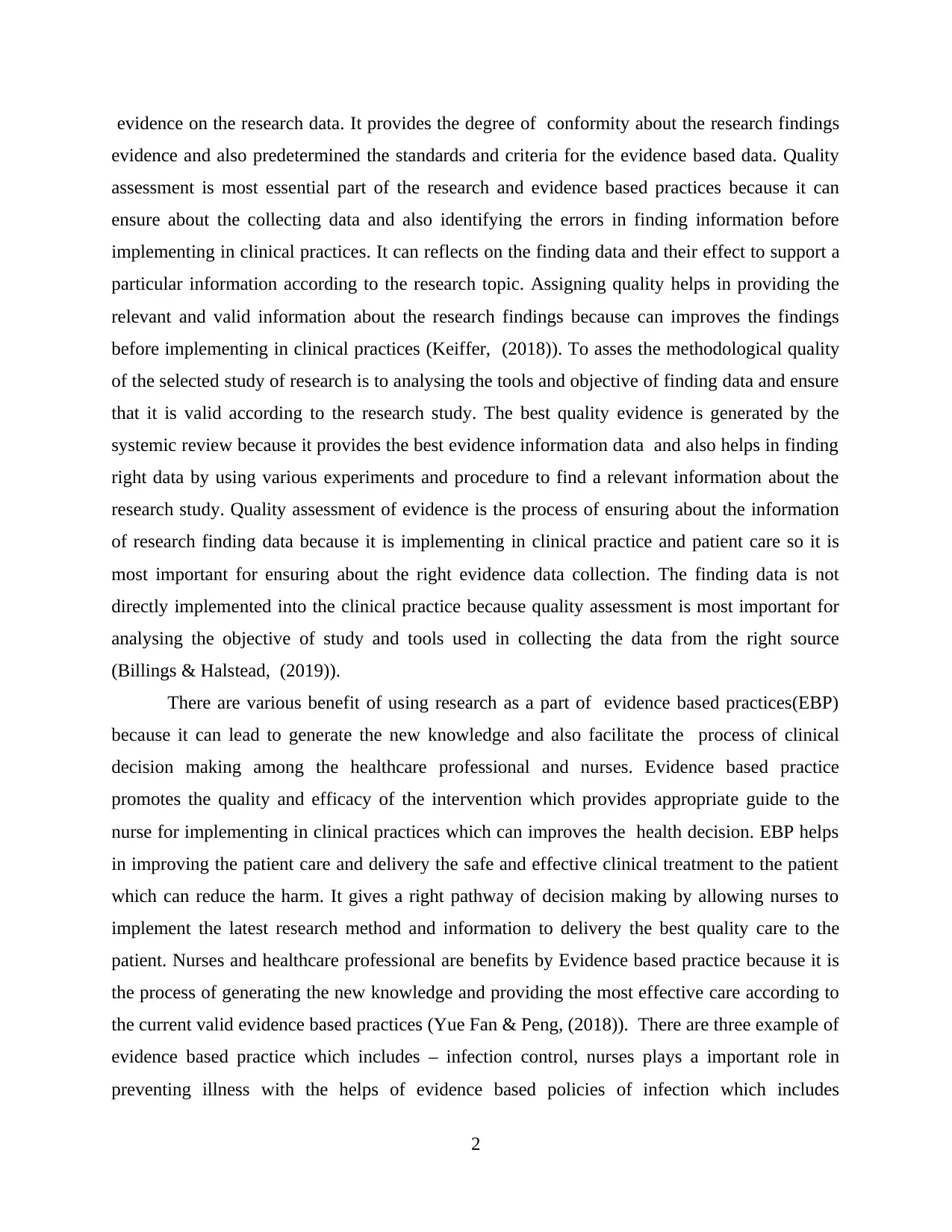
evidence on the research data. It provides the degree of conformity about the research findings
evidence and also predetermined the standards and criteria for the evidence based data. Quality
assessment is most essential part of the research and evidence based practices because it can
ensure about the collecting data and also identifying the errors in finding information before
implementing in clinical practices. It can reflects on the finding data and their effect to support a
particular information according to the research topic. Assigning quality helps in providing the
relevant and valid information about the research findings because can improves the findings
before implementing in clinical practices (Keiffer, (2018)). To asses the methodological quality
of the selected study of research is to analysing the tools and objective of finding data and ensure
that it is valid according to the research study. The best quality evidence is generated by the
systemic review because it provides the best evidence information data and also helps in finding
right data by using various experiments and procedure to find a relevant information about the
research study. Quality assessment of evidence is the process of ensuring about the information
of research finding data because it is implementing in clinical practice and patient care so it is
most important for ensuring about the right evidence data collection. The finding data is not
directly implemented into the clinical practice because quality assessment is most important for
analysing the objective of study and tools used in collecting the data from the right source
(Billings & Halstead, (2019)).
There are various benefit of using research as a part of evidence based practices(EBP)
because it can lead to generate the new knowledge and also facilitate the process of clinical
decision making among the healthcare professional and nurses. Evidence based practice
promotes the quality and efficacy of the intervention which provides appropriate guide to the
nurse for implementing in clinical practices which can improves the health decision. EBP helps
in improving the patient care and delivery the safe and effective clinical treatment to the patient
which can reduce the harm. It gives a right pathway of decision making by allowing nurses to
implement the latest research method and information to delivery the best quality care to the
patient. Nurses and healthcare professional are benefits by Evidence based practice because it is
the process of generating the new knowledge and providing the most effective care according to
the current valid evidence based practices (Yue Fan & Peng, (2018)). There are three example of
evidence based practice which includes – infection control, nurses plays a important role in
preventing illness with the helps of evidence based policies of infection which includes
2
evidence and also predetermined the standards and criteria for the evidence based data. Quality
assessment is most essential part of the research and evidence based practices because it can
ensure about the collecting data and also identifying the errors in finding information before
implementing in clinical practices. It can reflects on the finding data and their effect to support a
particular information according to the research topic. Assigning quality helps in providing the
relevant and valid information about the research findings because can improves the findings
before implementing in clinical practices (Keiffer, (2018)). To asses the methodological quality
of the selected study of research is to analysing the tools and objective of finding data and ensure
that it is valid according to the research study. The best quality evidence is generated by the
systemic review because it provides the best evidence information data and also helps in finding
right data by using various experiments and procedure to find a relevant information about the
research study. Quality assessment of evidence is the process of ensuring about the information
of research finding data because it is implementing in clinical practice and patient care so it is
most important for ensuring about the right evidence data collection. The finding data is not
directly implemented into the clinical practice because quality assessment is most important for
analysing the objective of study and tools used in collecting the data from the right source
(Billings & Halstead, (2019)).
There are various benefit of using research as a part of evidence based practices(EBP)
because it can lead to generate the new knowledge and also facilitate the process of clinical
decision making among the healthcare professional and nurses. Evidence based practice
promotes the quality and efficacy of the intervention which provides appropriate guide to the
nurse for implementing in clinical practices which can improves the health decision. EBP helps
in improving the patient care and delivery the safe and effective clinical treatment to the patient
which can reduce the harm. It gives a right pathway of decision making by allowing nurses to
implement the latest research method and information to delivery the best quality care to the
patient. Nurses and healthcare professional are benefits by Evidence based practice because it is
the process of generating the new knowledge and providing the most effective care according to
the current valid evidence based practices (Yue Fan & Peng, (2018)). There are three example of
evidence based practice which includes – infection control, nurses plays a important role in
preventing illness with the helps of evidence based policies of infection which includes
2
Paraphrase This Document
Need a fresh take? Get an instant paraphrase of this document with our AI Paraphraser
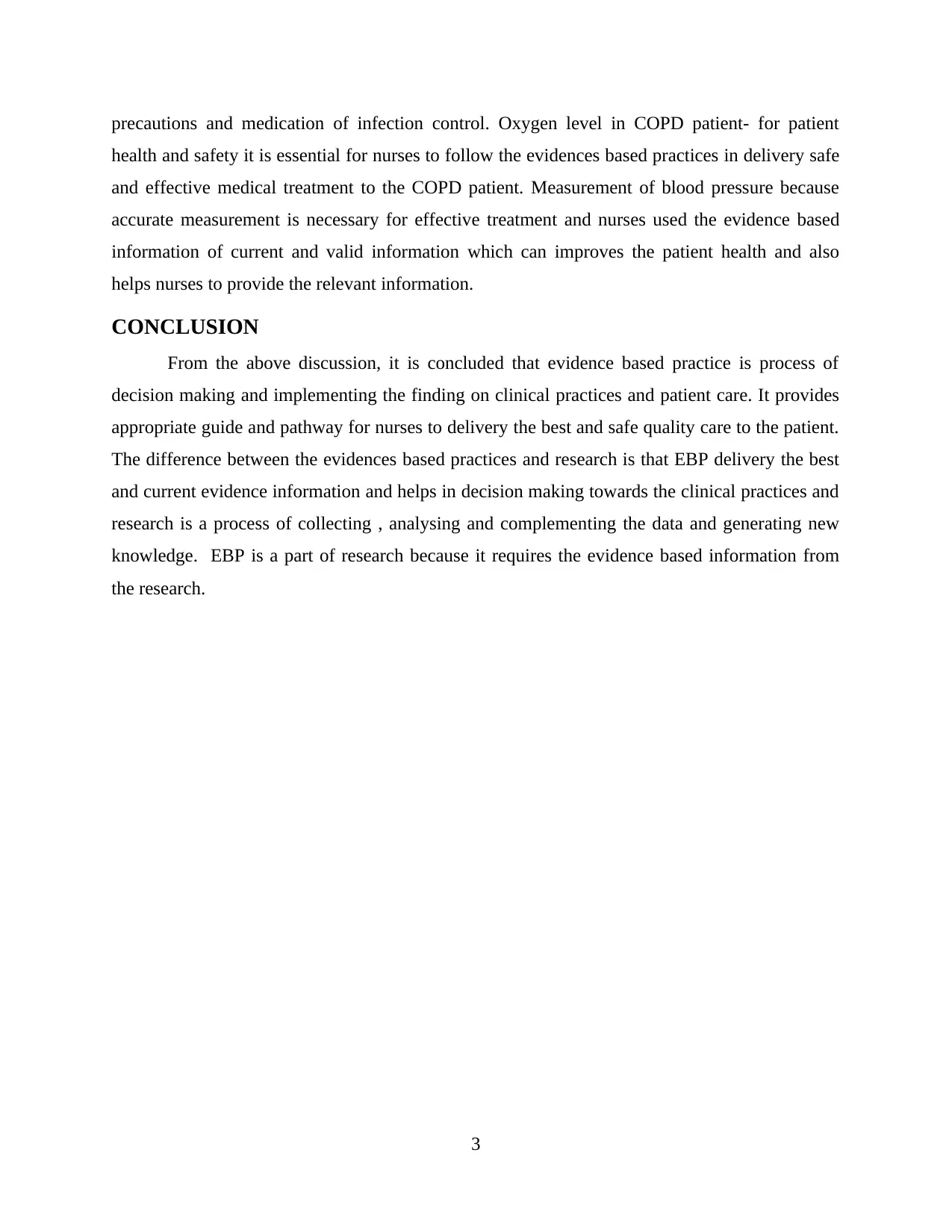
precautions and medication of infection control. Oxygen level in COPD patient- for patient
health and safety it is essential for nurses to follow the evidences based practices in delivery safe
and effective medical treatment to the COPD patient. Measurement of blood pressure because
accurate measurement is necessary for effective treatment and nurses used the evidence based
information of current and valid information which can improves the patient health and also
helps nurses to provide the relevant information.
CONCLUSION
From the above discussion, it is concluded that evidence based practice is process of
decision making and implementing the finding on clinical practices and patient care. It provides
appropriate guide and pathway for nurses to delivery the best and safe quality care to the patient.
The difference between the evidences based practices and research is that EBP delivery the best
and current evidence information and helps in decision making towards the clinical practices and
research is a process of collecting , analysing and complementing the data and generating new
knowledge. EBP is a part of research because it requires the evidence based information from
the research.
3
health and safety it is essential for nurses to follow the evidences based practices in delivery safe
and effective medical treatment to the COPD patient. Measurement of blood pressure because
accurate measurement is necessary for effective treatment and nurses used the evidence based
information of current and valid information which can improves the patient health and also
helps nurses to provide the relevant information.
CONCLUSION
From the above discussion, it is concluded that evidence based practice is process of
decision making and implementing the finding on clinical practices and patient care. It provides
appropriate guide and pathway for nurses to delivery the best and safe quality care to the patient.
The difference between the evidences based practices and research is that EBP delivery the best
and current evidence information and helps in decision making towards the clinical practices and
research is a process of collecting , analysing and complementing the data and generating new
knowledge. EBP is a part of research because it requires the evidence based information from
the research.
3
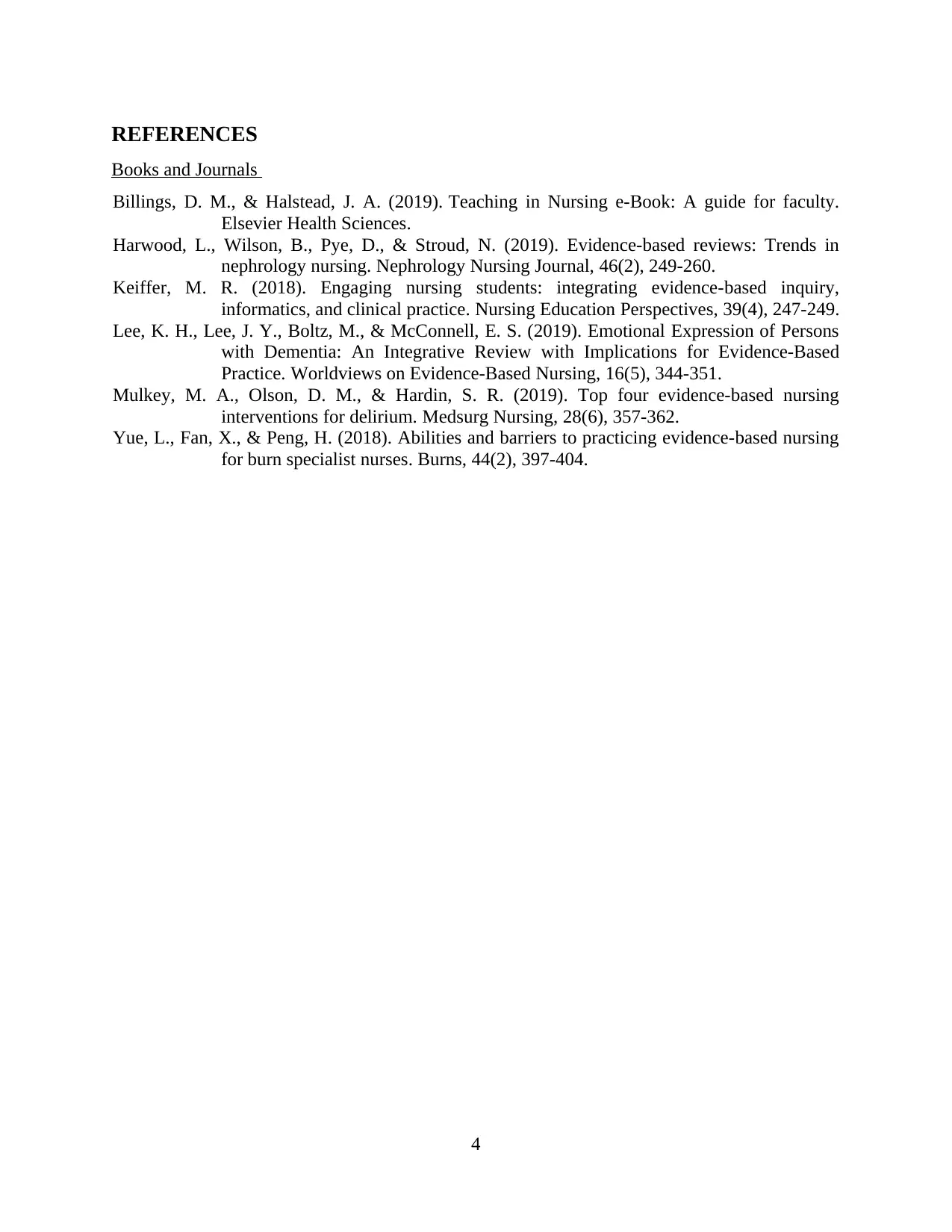
REFERENCES
Books and Journals
Billings, D. M., & Halstead, J. A. (2019). Teaching in Nursing e-Book: A guide for faculty.
Elsevier Health Sciences.
Harwood, L., Wilson, B., Pye, D., & Stroud, N. (2019). Evidence-based reviews: Trends in
nephrology nursing. Nephrology Nursing Journal, 46(2), 249-260.
Keiffer, M. R. (2018). Engaging nursing students: integrating evidence-based inquiry,
informatics, and clinical practice. Nursing Education Perspectives, 39(4), 247-249.
Lee, K. H., Lee, J. Y., Boltz, M., & McConnell, E. S. (2019). Emotional Expression of Persons
with Dementia: An Integrative Review with Implications for Evidence‐Based
Practice. Worldviews on Evidence‐Based Nursing, 16(5), 344-351.
Mulkey, M. A., Olson, D. M., & Hardin, S. R. (2019). Top four evidence-based nursing
interventions for delirium. Medsurg Nursing, 28(6), 357-362.
Yue, L., Fan, X., & Peng, H. (2018). Abilities and barriers to practicing evidence-based nursing
for burn specialist nurses. Burns, 44(2), 397-404.
4
Books and Journals
Billings, D. M., & Halstead, J. A. (2019). Teaching in Nursing e-Book: A guide for faculty.
Elsevier Health Sciences.
Harwood, L., Wilson, B., Pye, D., & Stroud, N. (2019). Evidence-based reviews: Trends in
nephrology nursing. Nephrology Nursing Journal, 46(2), 249-260.
Keiffer, M. R. (2018). Engaging nursing students: integrating evidence-based inquiry,
informatics, and clinical practice. Nursing Education Perspectives, 39(4), 247-249.
Lee, K. H., Lee, J. Y., Boltz, M., & McConnell, E. S. (2019). Emotional Expression of Persons
with Dementia: An Integrative Review with Implications for Evidence‐Based
Practice. Worldviews on Evidence‐Based Nursing, 16(5), 344-351.
Mulkey, M. A., Olson, D. M., & Hardin, S. R. (2019). Top four evidence-based nursing
interventions for delirium. Medsurg Nursing, 28(6), 357-362.
Yue, L., Fan, X., & Peng, H. (2018). Abilities and barriers to practicing evidence-based nursing
for burn specialist nurses. Burns, 44(2), 397-404.
4
⊘ This is a preview!⊘
Do you want full access?
Subscribe today to unlock all pages.

Trusted by 1+ million students worldwide
1 out of 6
Related Documents
Your All-in-One AI-Powered Toolkit for Academic Success.
+13062052269
info@desklib.com
Available 24*7 on WhatsApp / Email
![[object Object]](/_next/static/media/star-bottom.7253800d.svg)
Unlock your academic potential
Copyright © 2020–2026 A2Z Services. All Rights Reserved. Developed and managed by ZUCOL.





